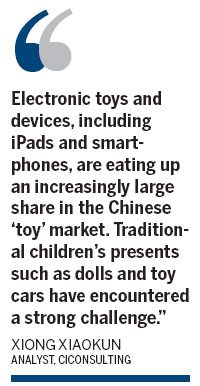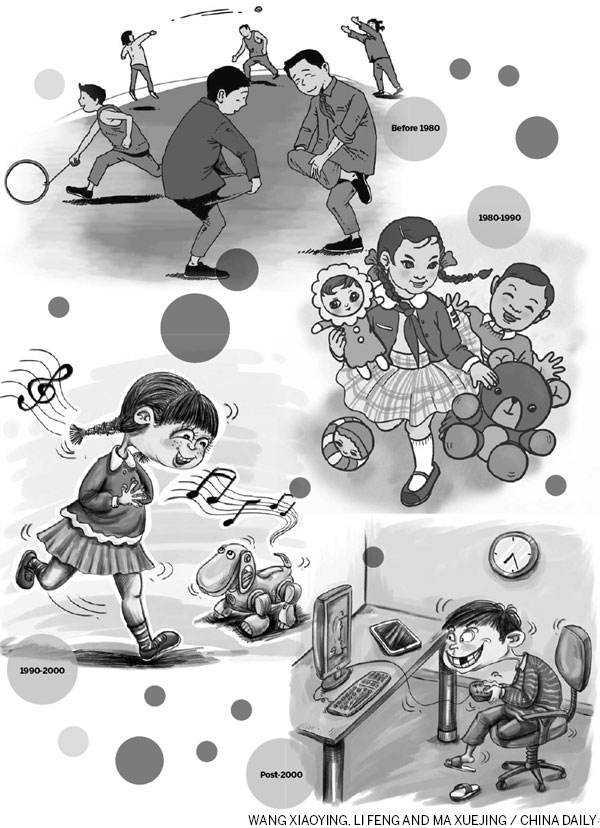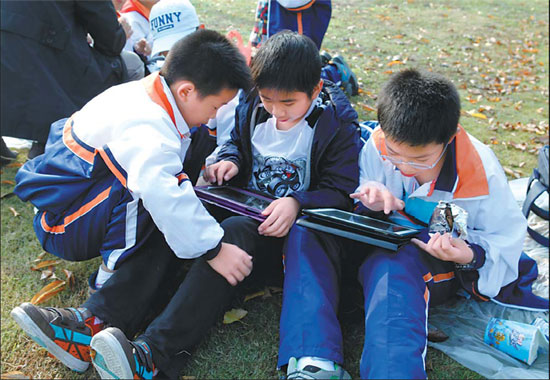Children toy with new forms of leisure
Updated: 2013-01-28 05:45
By Shen Jingting, Chen Limin and Gao Yuan (China Daily)
|
||||||||
|
Two primary school students playing games on their iPads while another keenly watches. Electronic games and devices, including iPads and smartphones, are making up an increasingly large share of the Chinese toy market. Traditional children's presents such as dolls and toy cars have been hit hard. Zhu Haiwei / For China Daily |
Old-fashioned games give way to electronic devices, gadgets
For Wu Jia, a 14-year-old student from Guangdong province, building blocks and model cars - toys with which he used to happily play - are no longer attractive.
An iPad, which he bought with his hongbao (red envelope) a year ago, now occupies his spare time.
He normally uses the device to go online and play games once a week when he returns home from school. "The iPad and iPhone are the most popular distractions among my classmates," he said.
Wu's two younger brothers also quickly fell in love with the high-tech gadget produced by US-based Apple Inc. "They (the younger brothers) have an iPad and an iPod Touch now. Our mother usually allows them to play as a reward when they behave well," Wu said.
Just like Wu, Chinese children, especially those living in cities, are developing a strong interest in high-tech electronic devices, analysts have discovered.

"If we look around, children are borrowing iPads and iPhones from their parents. They turn out to be quick learners and have much fun with their new favorite 'toys'," said Xiong Xiaokun, an analyst at CIConsulting.
"Electronic toys and devices, including iPads and smartphones, are eating up an increasingly large share in the Chinese 'toy' market," Xiong said. "Traditional children's presents such as dolls and toy cars have encountered a strong challenge."
What is happening in China now has already emerged in the United States. According to a survey conducted by Nielsen, about half of US children, aged between 6 and 12, wanted an iPad as the No 1 present last Christmas. The Nintendo Wii, iPod Touch, iPad Mini and iPhone are the top five children's dream gifts, the survey revealed.
On Taobao.com, China's largest e-commerce website, sales of electronic toys are on the rise.
Total sales of electronic toys in December were more than six times those a year earlier. The number of people who purchased this category rose by 367 percent over the same period, according to figures provided by Taobao.
The hottest items included handheld game consoles, Hasbro Inc's interactive robotic Furby toy and plastic Talking Tom Cat that can recite poems, tell stories and sing.
About 40 percent of the buyers in this category are aged between 30 and 34. "They are parents with children and most of the things they buy are children's toys," said Taobao in an e-mail to China Daily.
Game consoles followed with a 269 percent year-on-year increase in sales in December. The number of shoppers that bought this category more than quintupled from a year earlier.
Products of Microsoft Corp, Nintendo Co and Sony Corp were the most popular, attracting mainly male buyers aged between 18 and 29, said Taobao.
Tablet computers, which enjoy great popularity among Chinese tech-savvy users, also saw a 45 percent rise in sales in December compared with the same period in 2011. Although those aged between 18 and 29 formed the largest proportion of buyers of this category, some vendors tried to cash in on younger customers.
A search on Taobao for children's tablet computers shows more than 1,800 items. They look like a handheld game console or Apple Inc's iPad, but combine the functions of learning and entertainment.
"The reason electronic devices capture children's attention is because they are innovative, easily satisfy their curiosity and have powerful functions," said Zhang Chao, an electronic product vendor in Beijing's Zhongguancun district.
Successful marketing campaigns are necessary weapons for electronic companies to win in the children's market, Zhang said. "Take Apple for example. It offered free iPads to schools and launched ads on China's most popular cartoon TV channel. Those moves helped Apple products penetrate children's lives," he added.
Amusing applications
Wang Lirong, a Beijing mother who has a 5-year-old daughter, said: "I did not show my daughter any Apple product but one day, after watching some cartoons, she asked me to buy her an iPad, saying 'It looks fun'."
There are numerous interesting mobile applications showcased on electronic devices such as iPads and iPhones. "Applications are the core content and play a vital role in attracting children's attention," said Xiang Ligang, a Beijing-based industry insider.
"If there is no application, electronic products are like empty boxes," he added. Application developers for Apple's iOS platform have designed diversified software to entertain children and enable them to play and learn.

"Poetry apps teach children to read and recite poems written during the Tang Dynasty (AD 618-907). Music apps amuse children by singing songs. Game apps create scenarios for play and to encourage competition with each other," Xiang said.
A mobile device such as an iPad provides multiple functions in children's lives - it's a teacher, a playmate and, sometimes, a close relative, he added.
Data from Fujian-based game application developer platform sj.91.com showed that the download number of apps developed for children on Apple Inc's iOS platform was hitting 40 million a month in late 2012.
The download number was fewer than 20 million times a month in May 2012.
Chinese developers are making all kinds of apps to feed the increasing demand.
In November, Yashili Group Co, China's top dairy product manufacturer, released a free game app on iOS and Android platforms, making the company one of the first milk powder makers in the country to launch game software.
The Guangdong-based company believes the initiative will win the hearts of children, resulting in their parents spending more on Yashili's products.
Gaming online
Every day when primary school student Tian Xiaolei finishes his homework, his parents allow him to spend 45 minutes online playing video games as a reward for his straight As at school. It is "the only moment in a day" that the 11-year-old can sit back and not worry about school work.
Studying at Zhongguancun No 3 primary school, the most renowned elementary education institution in Beijing, Tian is a diehard fan of Mole Manor, an online game especially developed for Tian and his peers. "Almost everyone in my class is talking about Mole Manor," said the boy.
Tian and his ilks' online playtime has become a huge business for game developers.
TaoMee Inc, the developer of Mole Manor and one of the nation's top gaming companies, said it had approximately 57.7 million active accounts on the Chinese mainland as of the third quarter of 2012.
Most of the players are Chinese teenagers.
"Our strategy of increasing active user growth and engagement is proving effective as evidenced by the 32 percent increase in sequential user growth and stable average revenue per user during the third quarter of 2012," said Benson Wang, TaoMee's co-founder and chief executive officer.
The gaming industry for children is becoming a main driver for the Internet-based entertainment industry in China.
Teenagers are also the major component of the country's Internet industry.
Nearly a quarter of China's Internet users were aged between 10 and 19 by the end of 2012, data from China Internet Network Information Center showed.
Challenges ahead
The changing landscape of the children's toy market has prompted a booming business for electronic product manufacturers such as Apple and Samsung. However, it is hurting traditional toy makers.
The world's top toy vendors Mattel and Hasbro are said to be "terrified" at the thought that children no longer plump for traditional presents such as dolls and toy cars, preferring the latest technological gadgets, including iPads and Kindles, the UK's Financial Times reported.
Analysts have lowered predictions for full-year toy sales, estimated at $1.41 billion for Hasbro and $3.29 billion for Mattel, after sales to date for the year 2012 were down on the previous year.
China is the world's biggest toy manufacturing base by production. According to the National Bureau of Statistics, China exported $11 billion toy products in 2010, almost double the $5.87 billion a decade ago.
"There are challenges but, in the meantime, we see opportunities," an official surnamed Zhao with a Dongguan-based toy company, said. "When children play online games, they may want to buy gaming figure models in stores," he added.
"In addition, parents usually set limits for children playing electronic devices, over concerns for their eyesight etc. So there is still room for traditional toys," Zhao said.
But most Chinese toymakers are not well prepared for the current changes. "A large number of toy manufacturers may suffer. Only a few of them can survive," said Xiong at CIConsulting.
Social concerns over children's obsession with electronic toys have arisen. Wu Jia in Guangdong said students at his school are not allowed to bring the devices into classrooms because teachers worry they might distract them from their studies.
"Children are too young to avoid obsession with high-tech gadgets. If they indulge in these devices, it may be harmful to their healthy growth," said Wang, the Beijing mother.
Contact the reporters at shenjingting@chinadaily.com.cn, chenlimin@chinadaily.com.cn, gaoyuan@chinadaily.com.cn

(China Daily 01/28/2013 page13)

 In Photos: 7.0-magnitude quake hits Sichuan
In Photos: 7.0-magnitude quake hits Sichuan
 Li Na on Time cover, makes influential 100 list
Li Na on Time cover, makes influential 100 list
 FBI releases photos of 2 Boston bombings suspects
FBI releases photos of 2 Boston bombings suspects
 World's wackiest hairstyles
World's wackiest hairstyles
 Sandstorms strike Northwest China
Sandstorms strike Northwest China
 Never-seen photos of Madonna on display
Never-seen photos of Madonna on display
 H7N9 outbreak linked to waterfowl migration
H7N9 outbreak linked to waterfowl migration
 Dozens feared dead in Texas plant blast
Dozens feared dead in Texas plant blast
Most Viewed
Editor's Picks

|

|

|

|

|

|
Today's Top News
Live report: 7.0-magnitude quake hits Sichuan, heavy casualties feared
Boston suspect cornered on boat
Cross-talk artist helps to spread the word
'Green' awareness levels drop in Beijing
Palace Museum spruces up
First couple on Time's list of most influential
H7N9 flu transmission studied
Trading channels 'need to broaden'
US Weekly

|

|








